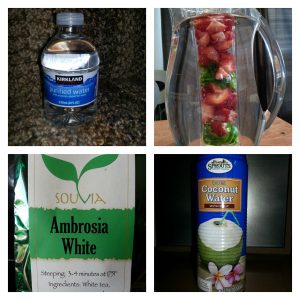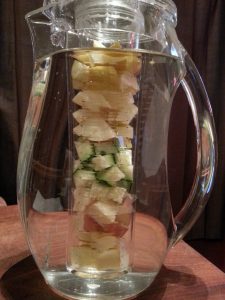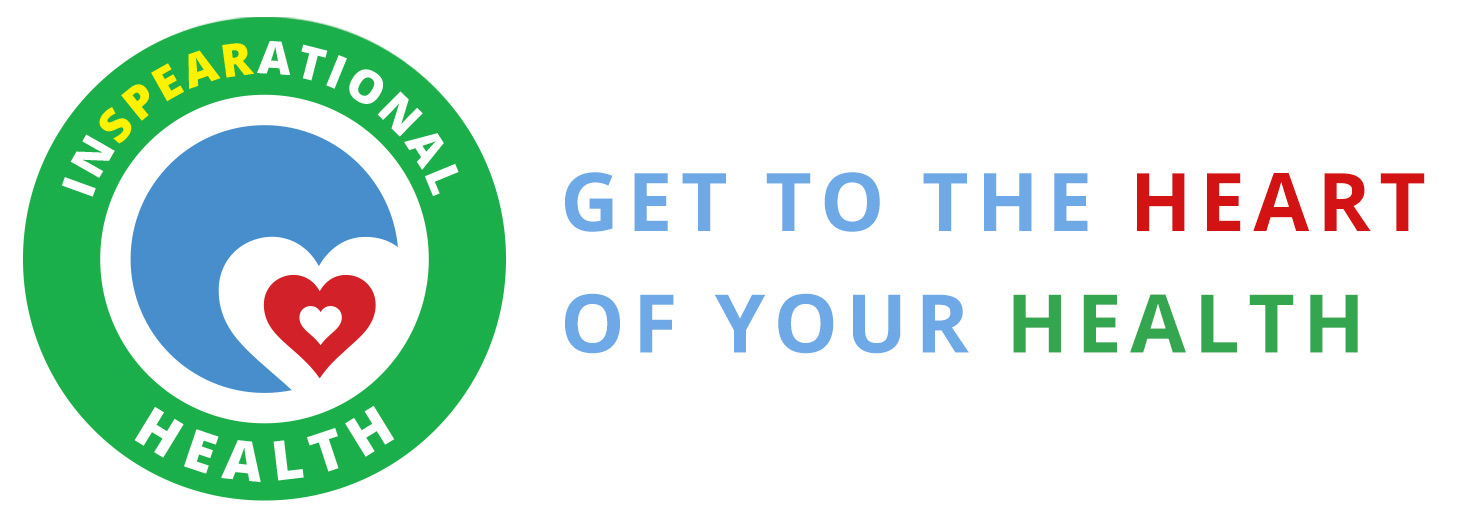In your efforts to stay hydrated, are all liquids created equal? Does 16 oz of coffee equal 16 oz of water? Do you need an electrolyte beverage? Should you “drink your vitamins” using a water with added vitamins? Wow, so many questions! (Sorry, this is a bit of a long post with several links)
This is one of those gray areas where you ask 10 people the same question and you are likely to get 10 different answers. Educate yourself and make informed decisions that work best for you. Let’s look at some of your beverage options one-by-one.
Coffee – I think the biggest argument is whether caffeinated beverages count into your “water” intake. Even decaf coffee has some caffeine. The deal is caffeine is a diuretic which causes you to urinate more often. One could argue that this is a positive effect to drinking caffeine and one could also argue against it. My thought with coffee, specifically caffeine, is do you control it or does it control you?
Tea – Yes, this is a broad category as there are many different types of tea (green, white, black, oolong). The fact is, tea comes from the same plant, the camellia sinensis. The various types of tea differ because of the processing method. We hear about many health benefits to drinking tea. What we may not realize is the amount of tea you need to drink to obtain those benefits. Regardless, I have the same comment here as with coffee. Whether you drink the “required” amount to obtain the health benefits or not, when it is caffeinated, are you drinking it because you need the caffeine?
Herbal tea – All herbal teas are naturally caffeine-free. Herbal tea will provide the same health benefits as the herb it contains. So, peppermint tea will provide the same benefits as mint. Because there is no caffeine and you obtain health benefits, I consider herbal teas right up there with water.
 Soda (diet too) – Ouch. Do I have to go here? Soda doesn’t provide health benefits. Regular soda contains a lot of sugar and calories. Diet soda contains artificial sweeteners that are, well artificial. Try to figure out what it is about the soda that makes you drink it and then see if there is an alternative that can replace it.
Soda (diet too) – Ouch. Do I have to go here? Soda doesn’t provide health benefits. Regular soda contains a lot of sugar and calories. Diet soda contains artificial sweeteners that are, well artificial. Try to figure out what it is about the soda that makes you drink it and then see if there is an alternative that can replace it.
Fruit juice – The first thing to make sure is that your fruit juice is actually 100% juice and not a fruit beverage that contains only a small amount of actual juice. The second thing to realize with fruit juice is the enormous amount of sugar you are drinking. An 8 oz glass of orange juice contains the juice of 3-4 oranges with very little fiber. My motto is eat the orange!
Electrolyte beverages – These may be prepared beverages in a bottle or powder that you add to plain water. This VisualMD video sums it up nicely. Athletes may require the additional electrolytes to supplement their bodies; otherwise, most people don’t need these. They often contain unnecessary calories. When you want an electrolyte beverage, I believe that powder form is better as the pre-mixed variety in bottles loses its effectiveness as it sits on the store shelf.
Coconut water – This is one of the latest fads as a possible replacement for electrolyte beverages. Additionally, a lot of health benefits are being touted from drinking coconut water. I think the same rules apply here in that many of us don’t require the add’l electrolytes in coconut water. Should you choose to enjoy coconut water on occasion, opt for plain to keep the calories and sugars as low as possible. (WebMD’s The Truth About Coconut Water)
Vitamin waters – Compare the label for a multi-vitamin and a vitamin water. Are they equal? No. So, don’t think you are getting all your vitamins when you drink vitamin water. You are better off drinking water when you take your multi-vitamin. (Livestrong’s Vitamin Water Health Facts)
Bottled water – You may or may not realize that many bottled waters are merely tap water (there is an interesting video with that link). They undergo additional treatment of some sort to ensure they comply with the FDA standards. I admit, I often don’t like the taste of tap water so I first look for filtered water to fill my water bottle. When that isn’t available, I may buy bottled water. (WebMD’s Rethinking Bottled Water – suggestions to make tap water taste better)
 If you aren’t a fan of plain water, add a lemon slice, cucumber slice, mint leaves, etc. Infuse your water overnight so it has more flavor and then keep adding to it throughout the day opposed to letting your bottle go empty. (Do this instead of bottled, flavored waters)
If you aren’t a fan of plain water, add a lemon slice, cucumber slice, mint leaves, etc. Infuse your water overnight so it has more flavor and then keep adding to it throughout the day opposed to letting your bottle go empty. (Do this instead of bottled, flavored waters)
My theory is to drink sufficient water to stay hydrated and enjoy other beverages beyond that. This way you will most likely avoid dehydration and also get to indulge in your chai tea, coffee, green tea, or other beverage of choice. (Keep in mind, it is easy to drink calories when you add specialty beverages to your diet, or even add some cream or non-dairy milk to your coffee. And the “0 water” options may not add calories, however they may not be any healthier depending on the ingredients.)
Should you want to read more in-depth about all fluids not being equal, this is a great article from the University of Tennessee.
Check out Mayo Clinic’s Caffeine content for coffee, tea, soda, and more if you are curious to see details on the amount of caffeine in numerous beverages.
